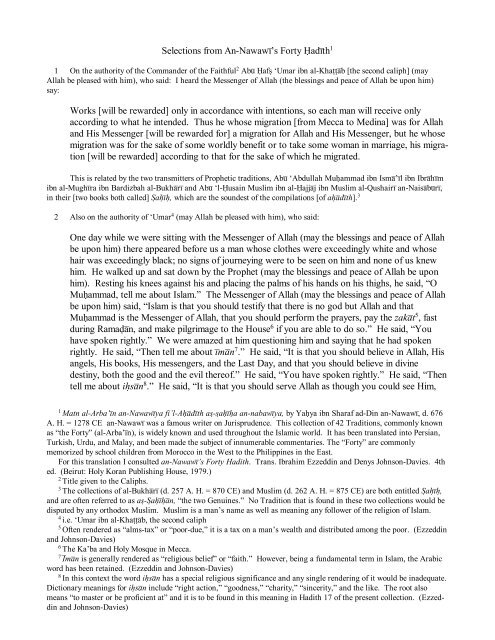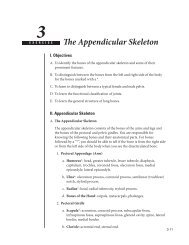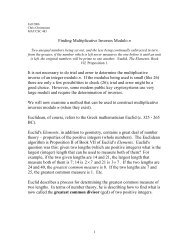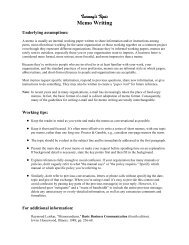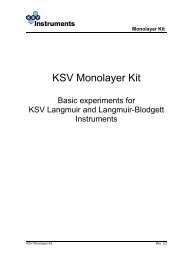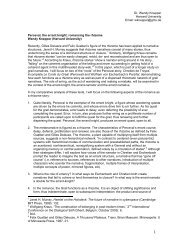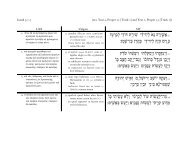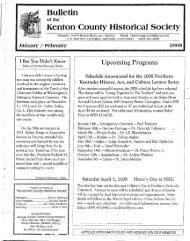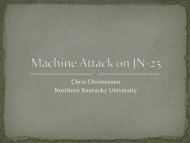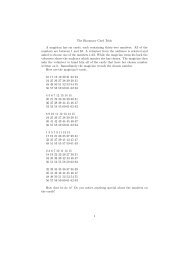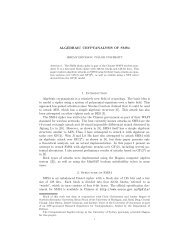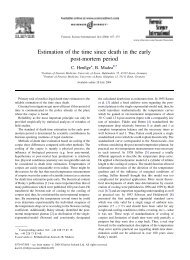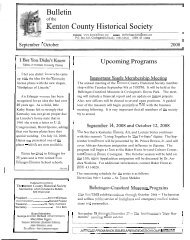An-Nawawi's 40 Hadith
An-Nawawi's 40 Hadith
An-Nawawi's 40 Hadith
You also want an ePaper? Increase the reach of your titles
YUMPU automatically turns print PDFs into web optimized ePapers that Google loves.
Selections from <strong>An</strong>-Nawawī’s Forty Ḥadīth 1<br />
1 On the authority of the Commander of the Faithful 2 Abū Ḥafṣ ‘Umar ibn al-Khaṭṭāb [the second caliph] (may<br />
Allah be pleased with him), who said: I heard the Messenger of Allah (the blessings and peace of Allah be upon him)<br />
say:<br />
Works [will be rewarded] only in accordance with intentions, so each man will receive only<br />
according to what he intended. Thus he whose migration [from Mecca to Medina] was for Allah<br />
and His Messenger [will be rewarded for] a migration for Allah and His Messenger, but he whose<br />
migration was for the sake of some worldly benefit or to take some woman in marriage, his migration<br />
[will be rewarded] according to that for the sake of which he migrated.<br />
This is related by the two transmitters of Prophetic traditions, Abū ‘Abdullah Muḥammad ibn Ismā’īl ibn Ibrāhīm<br />
ibn al-Mughīra ibn Bardizbah al-Bukhārī and Abū ‘l-Ḥusain Muslim ibn al-Ḥajjāj ibn Muslim al-Qushairī an-Naisābūrī,<br />
in their [two books both called] Ṣaḥīḥ, which are the soundest of the compilations [of aḥādīth]. 3<br />
2 Also on the authority of ‘Umar 4 (may Allah be pleased with him), who said:<br />
One day while we were sitting with the Messenger of Allah (may the blessings and peace of Allah<br />
be upon him) there appeared before us a man whose clothes were exceedingly white and whose<br />
hair was exceedingly black; no signs of journeying were to be seen on him and none of us knew<br />
him. He walked up and sat down by the Prophet (may the blessings and peace of Allah be upon<br />
him). Resting his knees against his and placing the palms of his hands on his thighs, he said, “O<br />
Muḥammad, tell me about Islam.” The Messenger of Allah (may the blessings and peace of Allah<br />
be upon him) said, “Islam is that you should testify that there is no god but Allah and that<br />
Muḥammad is the Messenger of Allah, that you should perform the prayers, pay the zakāt 5 , fast<br />
during Ramaḍān, and make pilgrimage to the House 6 if you are able to do so.” He said, “You<br />
have spoken rightly.” We were amazed at him questioning him and saying that he had spoken<br />
rightly. He said, “Then tell me about īmān 7 .” He said, “It is that you should believe in Allah, His<br />
angels, His books, His messengers, and the Last Day, and that you should believe in divine<br />
destiny, both the good and the evil thereof.” He said, “You have spoken rightly.” He said, “Then<br />
tell me about iḥsān 8 .” He said, “It is that you should serve Allah as though you could see Him,<br />
1<br />
Matn al-Arba’īn an-Nawawīya fi’l-Aḥādīth aṣ-ṣaḥīḥa an-nabawīya, by Yaḥya ibn Sharaf ad-Din an-Nawawī, d. 676<br />
A. H. = 1278 CE an-Nawawī was a famous writer on Jurisprudence. This collection of 42 Traditions, commonly known<br />
as “the Forty” (al-Arba’īn), is widely known and used throughout the Islamic world. It has been translated into Persian,<br />
Turkish, Urdu, and Malay, and been made the subject of innumerable commentaries. The “Forty” are commonly<br />
memorized by school children from Morocco in the West to the Philippines in the East.<br />
For this translation I consulted an-Nawawī’s Forty <strong>Hadith</strong>. Trans. Ibrahim Ezzeddin and Denys Johnson-Davies. 4th<br />
ed. (Beirut: Holy Koran Publishing House, 1979.)<br />
2<br />
Title given to the Caliphs.<br />
3<br />
The collections of al-Bukhārī (d. 257 A. H. = 870 CE) and Muslim (d. 262 A. H. = 875 CE) are both entitled Ṣaḥīḥ,<br />
and are often referred to as aṣ-Ṣaḥīḥān, “the two Genuines.” No Tradition that is found in these two collections would be<br />
disputed by any orthodox Muslim. Muslim is a man’s name as well as meaning any follower of the religion of Islam.<br />
4<br />
i.e. ‘Umar ibn al-Khaṭṭāb, the second caliph<br />
5<br />
Often rendered as “alms-tax” or “poor-due,” it is a tax on a man’s wealth and distributed among the poor. (Ezzeddin<br />
and Johnson-Davies)<br />
6<br />
The Ka’ba and Holy Mosque in Mecca.<br />
7<br />
Īmān is generally rendered as “religious belief” or “faith.” However, being a fundamental term in Islam, the Arabic<br />
word has been retained. (Ezzeddin and Johnson-Davies)<br />
8<br />
In this context the word iḥsān has a special religious significance and any single rendering of it would be inadequate.<br />
Dictionary meanings for iḥsān include “right action,” “goodness,” “charity,” “sincerity,” and the like. The root also<br />
means “to master or be proficient at” and it is to be found in this meaning in <strong>Hadith</strong> 17 of the present collection. (Ezzeddin<br />
and Johnson-Davies)
Selections from <strong>An</strong>-Nawawī’s Forty Ḥadīth Page 2<br />
for though you cannot see Him, yet He sees you.” He said, “Then tell me about the Hour 9 . He<br />
said, “About that the one questioned knows no more than the questioner.” He said, “Then tell me<br />
about its signs.” He said, “[They are] that the slave-girl will give birth to her mistress 10 and that<br />
you will see the barefooted, naked, destitute herdsmen building arrogantly high houses. 11 Then he<br />
took himself off and I stayed for a time. Then he [Muḥammad] said, “O ‘Umar, do you know<br />
who the questioner was?” I said, “Allah and His Messenger know best.” He said, “It was<br />
Gabriel, who came to you to teach you your religion.”<br />
Muslim relates this.<br />
3 On the authority of Abū ‘Abd ar-Raḥmān ‘Abdullah, the son of ‘Umar ibn al-Khaṭṭāb (may Allah be pleased with<br />
him), who said: I heard the Messenger of Allah (the blessings and peace of Allah be upon him) say:<br />
Islam has been built on five [pillars] 12 : testifying that there is no god but Allah and Muḥammad is<br />
the Messenger of Allah, performing the prayers, paying the zakāt, making the pilgrimage to the<br />
House, and fasting during Ramaḍān.<br />
al-Bukhārī and Muslim relate this.<br />
4 On the authority of Abū ‘Abd ar-Raḥmān ‘Abdullah ibn Mas’ūd (may Allah be pleased with him), who said: The<br />
Messenger of Allah (the blessings and peace of Allah be upon him) and he is the truthful, the reliable, reported to us:<br />
Verily the creation of each of you takes place when he is brought together in his mother’s womb.<br />
For forty days [he is] as a drop, then he similarly becomes a clot, and then similarly [he becomes<br />
like] a bite of meat. Then an angel is sent to him, and he blows the spirit [of life] into him. He<br />
[the angel] is commanded about four matters 13 : that he write down his fortune, his life-span, his<br />
works, and [whether in the Afterlife he will be] unhappy or happy. By Allah, other than Whom<br />
there is no god, verily one of you may work the works of the people of Paradise until there is but<br />
an arm’s length between him and it and that which is written will overtake him so that he works<br />
the works of the people of the Fire and he enters it. <strong>An</strong>d one of you may work the works of the<br />
people of the Fire until there is but an arm’s length between him and it and that which is written<br />
will overtake him so that he works the works of the people of Paradise and he enters it.<br />
al-Bukhārī and Muslim relate this.<br />
5 On the authority of the Mother of the Faithful 14 , Umm ‘Abdullah ‘Ā’isha (may Allah be pleased with her), who<br />
said: The Messenger of Allah (the blessings and peace of Allah be upon him) said:<br />
9<br />
i.e. of the Day of Judgment.<br />
10<br />
This phrase is capable of more than one interpretation. Among those given by an-Nawawī in his commentary is that<br />
slave-girls will give birth to sons and daughters who will become free and so be the masters of those who bore them. The<br />
word ama, normally translated “slave-girl,” is also capable of meaning any woman in that we are all slaves or servants of<br />
God. The words are thus capable of bearing the meaning: “When a woman will give birth to her master” i.e. a time will<br />
come when children will have so little respect for their mothers that they will treat them like servants. The commentators<br />
point out that here the word rabba (mistress) includes the masculine rabb (master). (Ezzeddin and Johnson-Davies)<br />
11<br />
<strong>An</strong>other translation: “competing in constructing lofty buildings”<br />
12<br />
The word “pillars” does not appear in the Arabic but has been supplied for clarity of meaning. Pillars (arkān) is the<br />
generally accepted term in this context. (Ezzeddin and Johnson-Davies)<br />
13<br />
lit. “words.”<br />
14<br />
A title accorded to any of the Prophet’s wives.
Selections from <strong>An</strong>-Nawawī’s Forty Ḥadīth Page 3<br />
Whoever introduces into this affair of ours [i.e., Islam] something that does not belong to it is a<br />
reprobate. 15<br />
al-Bukhārī and Muslim relate this. According to one line of transmission in Muslim [it reads]:<br />
Whoever works a work which has for it no command of ours is a reprobate. 16<br />
6 On the authority of Abū ‘Abdullah an-Nu’mān, the son of Bashīr (may Allah be pleased with them both), who<br />
said: I heard the Messenger of Allah (the blessings and peace of Allah be upon him) say:<br />
Verily what is lawful is obvious 17 , and what is unlawful is obvious, and between them are doubtful<br />
matters about which most people do not know [what to do]. He who is on his guard with respect<br />
to doubtful matters keeps his religion and his honor clean, but he who stumbles in doubtful matters<br />
stumbles into what is unlawful (al-ḥarām), like the shepherd who pastures [his flock] around<br />
a sanctuary, all but grazing in it. Truly every king has a sanctuary, and truly the sanctuary of<br />
Allah is his forbidden things 18 . Is it not true that in the body there is a bite of meat which, if it is<br />
healthy, the whole body is healthy, and if it is corrupted, the whole body is corrupted? Truly it is<br />
the heart.<br />
al-Bukhārī and Muslim relate this.<br />
7 On the authority of Abū Ruqayya Tamīm ibn Aus as-Dārī (may Allah be pleased with him) [who said]: The<br />
Prophet of Allah (the blessings and peace of Allah be upon him) said:<br />
Religion is sincerity. 19 We said, “To whom?” He said, “To Allah and His Book, and His Messenger,<br />
and the leaders (Imāms) of the Muslims, and their common folk. 20<br />
Muslim relates this.<br />
8 On the authority of Ibn ‘Umar 21 (with whom and with whose father may Allah be pleased) that the Messenger of<br />
Allah (the blessings and peace of Allah be upon him) said:<br />
I have been commanded that I do battle with people until they testify that there is no god but<br />
Allah and that Muḥammad is the Messenger of Allah and they perform the prayers and pay the<br />
zakāt. <strong>An</strong>d if they have done this, they have will have gained protection from me for their lives 22<br />
15<br />
<strong>An</strong>other translation: “will have it rejected.”<br />
16<br />
This Tradition in either of the forms is a warning against “innovation” (bid’a), the fear of which has ever been present<br />
to the Muslim theologians.<br />
17<br />
bayyin — clear, plain, evident, obvious<br />
18<br />
Other translations: “His prohibitions” and “His sacred place”<br />
19<br />
The Arabic word naṣīḥa has a variety of meanings, the most common being “good advice,” which is obviously<br />
unsuitable in the context. It also gives the meaning of “doing justice to a person or situation,” “probity,” “integrity,” and<br />
the like. (Ezzeddin and Johnson-Davies)<br />
20<br />
‘āmma — generality, commonality; the masses<br />
21<br />
i.e. ‘Umar ibn al-Khaṭṭāb, the second caliph<br />
22<br />
lit. “their blood.”
Selections from <strong>An</strong>-Nawawī’s Forty Ḥadīth Page 4<br />
and their property (except that which is Islam’s by right). 23 <strong>An</strong>d their reckoning is with Allah,<br />
exalted be He.<br />
al-Bukhārī and Muslim relate this.<br />
9 On the authority of Abū Huraira ‘Abd ar-Raḥmān ibn Ṣakhr (may Allah be pleased with him), who said: I heard<br />
the Messenger of Allah (the blessings and peace of Allah be upon him) say:<br />
What I have forbidden you, avoid; what I have commanded you [to do], do as much of it as you<br />
can. 24 What destroyed those [peoples] who were before you was their questionings and their disagreements<br />
with their Prophets.<br />
al-Bukhārī and Muslim relate this.<br />
11 On the authority of Abū Muḥammad al-Ḥasan the son of ‘Alī ibn Abī Ṭālib, the grandson of the Messenger of<br />
Allah (may the blessings and peace of Allah be upon him) and the child of his daughter 25 one much beloved (with whom<br />
and with his mother may Allah be pleased), who said: I memorized from the Messenger of Allah (may the blessings and<br />
peace of Allah be upon him):<br />
Leave that about which you are in doubt for that about which you are in no doubt.<br />
at-Tirmidhī and an-Nasā’ī 26 relate this, at-Tirmidhī saying, “It is a good and genuine Tradition.”<br />
13 On the authority of Abū Ḥamza <strong>An</strong>as ibn Mālik (may Allah be pleased with him), the servant 27 of the Messenger<br />
of Allah (may the blessings and peace of Allah be upon him), that the Prophet (may the blessings and peace of Allah be<br />
upon him) said:<br />
None of you [truly] believes [in Allah and in His religion] until he wishes for his brother what he<br />
wishes for himself.<br />
al-Bukhārī and Muslim relate this.<br />
14 On the authority of Ibn Mas’ūd (may Allah be pleased with him), who said: The Messenger of Allah (the blessings<br />
and peace of Allah be upon him) said:<br />
The blood of a Muslim may not be legally spilt unless he belongs to one of three [classes]: a<br />
married man who commits adultery, one who owes his soul for another soul [i.e. a murderer], and<br />
one who abandons his religion, [thus becoming] one who splits the community.<br />
al-Bukhārī and Muslim relate this.<br />
23<br />
I. e. though they save their lives and continue to hold their property, they must pay to the Muslim rulers the lawful<br />
taxes.<br />
24<br />
<strong>An</strong>other translation: “comply with as far as you are able.”<br />
25<br />
<strong>An</strong>other translation: “the one much beloved of him.” Lit. “and his fragrant flower.” the word raiḥāna was used by<br />
the Prophet in respect of al-Ḥasan and al-Ḥusain, the sons of ‘Alī ibn Abī Ṭālib, the Prophet’s cousin and son-in-law.<br />
26<br />
at-Tirmidhī (d. 279 A. H. = 892 CE) compiled the Jāmi’, which is usually reckoned the third of the six canonical<br />
Collections of Tradition, and an-Nasā’ī (d. 303 A. H. = 915 CE) compiled the Sunan which is generally counted the sixth<br />
of them.<br />
27<br />
<strong>An</strong>as ibn Mālik, when still a youth, was employed by the Prophet as a servant and is the authority for many Ḥadīth.<br />
He is often referred to as “the servant and friend of the Messenger of Allah.” (Ezzeddin and Johnson-Davies)
Selections from <strong>An</strong>-Nawawī’s Forty Ḥadīth Page 5<br />
17 On the authority of Abū Ya’lā Shaddād ibn Aus (may Allah be pleased with him), that the Messenger of Allah<br />
(may the blessings and peace of Allah be upon him) said:<br />
Verily Allah has prescribed proficiency in all things. Thus, if you kill, kill well; and if you<br />
slaughter, slaughter well. Let each of you sharpen his blade, and let him spare suffering to the<br />
animal he slaughters.<br />
Muslim relates this.<br />
18 On the authority of Abū Dharr Jundub ibn Junāda al-Ghifārī and Abū ‘Abd ar-Raḥmān Mu’ādh ibn Jabal (may<br />
Allah be pleased with them both), that the Messenger of Allah (may the blessings and peace of Allah be upon him) said:<br />
Fear Allah whoever you are, and follow up a bad deed with a good one and it will wipe [the former]<br />
out, and behave good-naturedly to people.<br />
at-Tirmidhī relates this, saying, “It is a good Tradition.” In some copies he says, “It is a good and genuine Tradition.”<br />
20 On the authority of Abū Mas’ūd ibn ‘Amr al-<strong>An</strong>ṣārī al-Badrī (may Allah be pleased with him), who said: The<br />
Messenger of Allah (may the blessings and peace of Allah be upon him) said:<br />
Among the things that people comprehended from the words of the First Prophecy 28 is: If it does<br />
not cause you to be ashamed, do whatever you wish. 29<br />
al-Bukhārī relates this.<br />
23 On the authority of Abū Mālik al-Ḥārith ibn ‘Aṣim al–Ash’ari (may Allah be pleased with him), who said: The<br />
Messenger of Allah (may the blessings and peace of Allah be upon him) said:<br />
Purity is half of faith. 30 [The repetition of the phrase] Al–ḥamdu lillāh [“Praise be to Allah”] will<br />
fill the scales [on the Judgment Day], and Subḥāna ‘llāh [“Exalted be Allah” 31 ] and Al–ḥamdu lillāh<br />
[“Praise be to Allah”] will fill all between heaven and earth. Prayer (aṣ–ṣalāh) will be a light;<br />
alms given in charity (aṣ-ṣadaqa) will be a demonstration; patient endurance will be an illumination;<br />
the Qur’ān will be an argument for you or against you. Everyone will come [to the<br />
Judgment] with his soul at stake, either freeing it or destroying it.<br />
Muslim relates this.<br />
24 On the authority of Abū Dharr al-Ghifārī (may Allah be pleased with him) from the Prophet (may the blessings<br />
and peace of Allah be upon him) is that among the sayings he relates from his Lord 32 (may He be glorified) is that He<br />
said:<br />
28<br />
i.e. from those Prophets who preceded Muḥammad.<br />
29<br />
This ḥadīth is recognized as having two possible interpretations: a.) that one may safely act to one’s conscience so<br />
long as one feels no shame, and b.) that if one is not capable of any feeling of shame, there is nothing to prevent one from<br />
behaving as one likes, that is, badly. (Ezzeddin and Johnson-Davies)<br />
30<br />
<strong>An</strong>other translation: “Purity is the condition of faith.”<br />
31<br />
Others render: “How far is Allah from every imperfection”<br />
32<br />
This is a ḥadīth qudsī (sacred <strong>Hadith</strong>), i.e. one in which the Prophet reports what has been revealed to him by Allah,<br />
though not necessarily in His actual words. A ḥadīth qudsī is in no way regarded as part of the Holy Qur’ān. (Ezzeddin<br />
and Johnson-Davies)
Selections from <strong>An</strong>-Nawawī’s Forty Ḥadīth Page 6<br />
O My servants, I have forbidden wrong-doing 33 for Myself and have made it forbidden among<br />
you, so do not wrong one another. O My servants, all of you are astray except for the one I have<br />
guided, so ask guidance of Me and I will guide you. O My servants, all of you are hungry except<br />
for the one I have fed, so ask food of Me and I will feed you. O My servants, all of you are naked<br />
except for the one I have clothed, so ask clothing of Me and I will clothe you. O My servants,<br />
you sin night and day. It is I who forgive all sins, so ask My forgiveness and I will forgive you. O<br />
My servants, you will never attain to My power of harming so as to harm Me, nor my power of<br />
benefiting so as to benefit Me. O My servants, were the first of you and the last of you, those of<br />
you who are humans and those who are jinn, as good as the most pious heart among you, that<br />
would add nothing to My kingdom. O My servants, were the first of you and the last of you,<br />
those of you who are humans and those who are jinn, as wicked as the most wicked heart among<br />
you, that would take away nothing from My kingdom. O My servants, were the first of you and<br />
the last of you, those of you who are humans and those who are jinn, to rise in a single place and<br />
petition Me and I were to give to each what he asked, that would not lessen what I have anymore<br />
than a needle inserted into the ocean [would raise its level]. O My servants, it is your works alone<br />
for which I shall hold you to account and then recompense you for, so let him who finds good [in<br />
the Hereafter] praise Allah, and he who finds otherwise blame no one but himself.<br />
Muslim relates this.<br />
25 On the authority of Abū Dharr (may Allah be pleased with him):<br />
Some of the Companions 34 of the Messenger of Allah (may the blessings and peace of Allah be<br />
upon him) said to the Prophet (may the blessings and peace of Allah be upon him), “O Messenger,<br />
the rich take all the rewards. They pray just as we do and they fast just as we do, but they can<br />
give in charity out of the superabundance of their wealth [and so surpass us in storing up merit<br />
that will bring rewards].” He said, “Has not Allah appointed for you what you should give in<br />
charitable alms? Truly every tasbīḥa 35 is an alms, every takbīra 36 is a charity, every taḥmīda 37 is a<br />
charity, and every tahlīla 38 is a charity; to command what is right is a charity, to forbid what is<br />
wrong is a charity; and even in sexual intercourse [with one’s wife] there is a charity.” They said,<br />
“O Messenger of Allah, [do you mean that] when one of us fulfills his sexual desire [with his wife]<br />
there will be for him a reward for that?” He said, “What is your opinion? 39 If he put it in a forbidden<br />
place, would he not bear responsibility? Likewise, if he puts it in a permitted place, he will<br />
have a reward.” <strong>40</strong><br />
33<br />
Other translations of ẓulm are: wrong, iniquity, injustice, unfairness; oppression, repression, suppression, tyranny.<br />
34<br />
The Arabic word Ṣaḥābī (pl. Aṣḥāb or Ṣaḥāba) is given to a person who met the Prophet, believed in him, and died<br />
a Muslim. (Ezzeddin and Johnson-Davies)<br />
35<br />
To say Subḥāna ‘llāh (“Exalted be Allah”).<br />
36<br />
To say Allāhu akbar (“Allah is most great”).<br />
37<br />
To say Al–ḥamdu lillāh (“Praise be to Allah”).<br />
38<br />
To say Lā ilāha illā ‘llah (“There is no god but Allah”).<br />
39<br />
lit. “Have you seen?”<br />
<strong>40</strong><br />
Other translations: “What is your opinion? Had He put it among the things forbidden it would have been sinful for<br />
one, so when He put it among the allowable things there was a reward for it also.” and “Do you [not] think that were he to<br />
act upon it unlawfully he would be sinning? Likewise, if he has acted upon it lawfully he will have a reward.” (Ezzedin<br />
and Johnson-Davies)
Selections from <strong>An</strong>-Nawawī’s Forty Ḥadīth Page 7<br />
Muslim relates this.<br />
28 On the authority of Abū Najīḥ al-’Irbāḍ ibn Sāriya (may Allah be pleased with him), who said:<br />
The Messenger of Allah (may the blessings and peace of Allah be upon him) gave us a sermon by<br />
which our hearts were filled with fear and tears came to our eyes. We said: O Messenger of<br />
Allah, it is as though this were a farewell sermon, so counsel us. He said, “I counsel you to fear<br />
Allah (may He be glorified) and to give absolute obedience even if a slave becomes your leader.<br />
Verily he among you who lives [long enough] will see great controversy, so take care to observe<br />
my sunna and the sunna of the rightly-guided Caliphs, 41 holding on to them with your teeth.<br />
Beware of matters newly-introduced, for every innovation (bid’a) is a going astray (ḍalāla, error)<br />
and every going astray is in the [Hell–]Fire.<br />
Abū Dāwūd 42 relates this, as does at-Tirmidhī, who says: “<strong>An</strong> excellent, genuine Tradition.”<br />
31 On the authority of Abū ‘l–‘Abbās Sahl ibn Sa’d as–Sā’idī (may Allah be pleased with him), who said:<br />
A man came to the Prophet (may the blessings and peace of Allah be upon him) and said, “O Messenger<br />
of Allah, tell me what I can do to be loved by Allah and loved by people.” He said,<br />
“Abstain from this world and Allah will love you; abstain from what people possess and people<br />
will love you.”<br />
an acceptable Tradition which Ibn Māja 43 and others relate with an acceptable isnād. 44<br />
36 On the authority of Abū Huraira (may Allah be pleased with him) that the Prophet (the blessings and peace of<br />
Allah be upon him) said:<br />
Whoever banishes a believer’s worry pertaining to this world, Allah will banish from him some<br />
worry pertaining to the Day of Resurrection. Whoever alleviates [the lot of] a needy person, Allah<br />
will alleviate [his lot] in this world and the next. Whoever shields a Muslim, Allah will shield him<br />
in this world and the next. Allah will help the servant as long as the servant will help his brother.<br />
Whoever follows a path to seek knowledge in it, Allah will make easy for him a path to Paradise.<br />
No people gathers together in one of the houses of Allah reciting the Book of Allah and studying<br />
it among themselves, without tranquility 45 descending upon them, mercy enveloping them, angels<br />
41<br />
sunna means “customary way of acting,” so that in the Qur’ān the way Allah has dealt with former peoples is called<br />
“the sunna of Allah.” To follow Muḥammad’s sunna is to be a Sunnī, as opposed to the people of Shī’a who followed the<br />
family of ‘Alī, the Prophet’s cousin and son-in-law. The main purpose of the <strong>Hadith</strong> is to reveal the sunna of the Prophet<br />
and his Companion. The first four Caliphs were named by later Islam the “rightly-guided” Caliphs, and the period of<br />
office in the Caliphate came to be highly idealized.<br />
42<br />
Abū Dāwūd (d. 275 A. H. = 888 CE) complied the collection known as Sunan, which is generally regarded as the<br />
fourth of the six canonical collections.<br />
43<br />
Ibn Māja (d. 274 A. H. = 887 CE), a Persian from Qazvin, compiled the Sunan which is generally counted as the<br />
fifth of the six canonical collections.<br />
44<br />
Each Tradition in these collections consists of two parts, the matn or text, and the isnād or chain of authorities by<br />
whom it was handed down from the time of the companions of the Prophet to the collectors of the canonical collections.<br />
45<br />
The word used here for “tranquility” is sakīna, which is the Hebrew word shekīna, and shows that this Tradition was<br />
drawn from Rabbinic tradition (Tamid 32b) of how the Shekinah descends on those who study the Torah.
Selections from <strong>An</strong>-Nawawī’s Forty Ḥadīth Page 8<br />
surrounding them, and Allah making mention of them among those who are with Him. He whose<br />
work detains him 46 will not be hastened by his [noble] ancestry.”<br />
Muslim relates this in these words.<br />
37 On the authority of Ibn ‘Abbās (with whom and with whose father may Allah be pleased), from the Messenger of<br />
Allah (may the blessings and peace of Allah be upon him), is that among the sayings he relates from his Lord (glorified<br />
and exalted be He) is that He said:<br />
“Verily Allah has written down the good deeds and the evil deeds.” Then he clarified that.<br />
“Whoever intends to do a good deed but does not do it, Allah writes it down with Himself as a<br />
perfect good deed, but if he intends it and does it, Allah write it down with Himself as ten good<br />
deeds to seven hundred times, or many times over. But if he intends an evil deed and does not do<br />
it, Allah writes it down with Himself as a perfect good deed, and if he intends it and does it, Allah<br />
writes it down as one evil deed.”<br />
al-Bukhārī and Muslim relate this in their two Ṣaḥīḥs in these exact words.<br />
<strong>40</strong> On the authority of Ibn ‘Umar (with whom and with whose father may Allah be pleased), who said:<br />
The Messenger of Allah (may the blessings and peace of Allah be upon him) took me by the<br />
shoulder and said, “Be in the world as though you were a stranger or a traveler.”<br />
Ibn ‘Umar (with whom and with whose father may Allah be pleased) used to say:<br />
At evening do not expect [to live until] morning, and when morning comes do not expect [to live<br />
until] evening. Take from your health for your sickness and from your life for your death. 47<br />
41 On the authority of Abū Muḥammad ‘Abdullah ibn ‘Amr ibn al–‘Aṣ (may Allah be pleased with them both), who<br />
said: the Messenger of Allah (may the blessings and peace of Allah be upon him) said:<br />
None of you is a true believer until his inclination is in accordance with what I have brought.<br />
an acceptable and a sound Tradition which we have related in the Kitāb al–Ḥujja, with a genuine isnād. 48<br />
46<br />
i.e. on his path to Paradise.<br />
47<br />
i.e. while you are in good health you are able to perform your religious duties and should therefore take advantage of<br />
this fact. The same applies to the state of being alive. (Ezzedin and Johnson-Davies)<br />
48<br />
The complier has allowed himself to add to two further <strong>Hadith</strong> to the recognized number of forty, although the title<br />
of the work remains “<strong>An</strong>-Nawawī’s Forty.”


